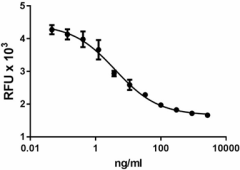- Regulatory Status
- RUO
- Other Names
- Colony Stimulating Factor 3 Receptor (CSF3R), Granulocyte Colony-Stimulating Factor Receptor (GCSFR), CD114, CD114 Antigen, G-CSF-R, SCN7

-

Human G-CSFR inhibits the proliferation of M-NFS-60 mouse myeloid cells induced by 0.4 ng/ml of human G-CSF. -

Stability testing for human G-CSFR. Human G-CSFR was aliquoted in PBS at 0.2 mg/ml and was treated as followed: one aliquot was kept at 4°C (control) and another was freeze-thawed four times (4 x freeze-thaws). After this procedure, the samples were tested for their ability to inhibit the proliferation of M-NFS-60 mouse myeloid cells induced by 0.4 ng/ml of human G-CSF.
| Cat # | Size | Price | Quantity Check Availability | ||
|---|---|---|---|---|---|
| 769902 | 10 µg | $218.00 | |||
| 769904 | 25 µg | $440.00 | |||
Human G-CSF receptor (CSF3R) was initially isolated from the cDNA libraries of human U937 leukemia cells. The human G-CSF receptor is a type I cytokine receptor, possesses 836 amino acids, and has a clear homology (62.5%) with its murine counterpart. G-CSFR contains a conserved cytokine receptor homologous (CRH) domain, an Ig-like domain and three fibronectin type III-like domains in the extracellular region; a transmembrane region; and an intracellular region lacking intrinsic catalytic activity. Human G-CSF soluble receptor has been identified this form has a deletion of the transmembrane domain. The complex G-CSF/G-CSFR has a 2:2 ligand:receptor stoichiometry. G-CSFR stimulates signals transduction proteins that induce granulocytic proliferation and differentiation such as the STAT 1, 3 and 5 transcription factors, the Ras/Mek/Erk1/2 pathway, the Src-related kinases Lyn and Hck, the serine/threonine kinase Akt, and the Syk tyrosine kinas. Also, G-CSFR is associated to pathways that negatively regulate granulopoiesis, including those mediated by the SHP-1 tyrosine phosphatase and the suppressor of cytokine signaling 3 (SOCS3) protein. Different mutations in the gene encoding the G-CSFR have been described with clinical consequences related to the myeloid lineage, including severe congenital neutropenia (SCN), myelodysplastic syndrome (MDS), acute myeloid leukemia (AML), and chronic neutrophilic leukemia (CNL).
Product Details
- Source
- Human G-CSFR, amino acids (Glu25-His627) (Accession # Q99062) was expressed in CHO cells. The carboxy terminus contains TGSR+hlgG-Fc+6His tag.
- Molecular Mass
- The 847 amino acid recombinant protein has a predicted molecular mass of approximately 94.7kD. The DTT-reduced and non-reduced protein migrate at approximately 115 kD and >200 kD respectively by SDS-PAGE. The predicted N-terminal amino acid is Glu.
- Purity
- >95% by SDS-PAGE gel as determined by Coomassie stained SDS-PAGE.
- Formulation
- 0.22 µm filtered protein solution is in PBS pH7.2.
- Endotoxin Level
- Less than 0.1 EU per µg (0.01 ng/µg) cytokine as determined by the LAL method.
- Concentration
- 10 and 25 µg sizes are bottled at 200 µg/mL.
- Storage & Handling
- Unopened vial can be stored between 2°C and 8°C for up to 2 weeks, at -20°C for up to six months, or at -70°C or colder until the expiration date. For maximum results, quick spin vial prior to opening. The protein can be aliquoted and stored at -20°C or colder. Stock solutions can also be prepared at 50 - 100 µg/mL in appropriate sterile buffer, carrier protein such as 0.2 - 1% BSA or HSA can be added when preparing the stock solution. Aliquots can be stored between 2°C and 8°C for up to one week and stored at -20°C or colder for up to 3 months. Avoid repeated freeze/thaw cycles.
- Activity
- Human G-CSFR inhibits the proliferation of M-NFS-60 mouse myeloid cells measured using Deep Blue Cell Viability™ Kit (Cat. No. 424701) and induced by 0.4 ng/ml of human G-CSF (Cat. No. 578602). The ED50 = 2 - 10 ng/ml.
- Application
-
Bioassay
- Application Notes
-
BioLegend carrier-free recombinant proteins provided in liquid format are shipped on blue-ice. Our comparison testing data indicates that when handled and stored as recommended, the liquid format has equal or better stability and shelf-life compared to commercially available lyophilized proteins after reconstitution. Our liquid proteins are verified in-house to maintain activity after shipping on blue ice and are backed by our 100% satisfaction guarantee. If you have any concerns, contact us at tech@biolegend.com.
Antigen Details
- Structure
- Cytokine receptor
- Distribution
-
Neutrophils, hematopoietic progenitor cells, placenta neurons, adult neural stem cells, endothelial cells, and cardiomyocytes.
- Function
- Controls production, differentiation, and function of granulocytes. Integrin α9β1 augments receptor signaling and granulopoiesis in vivo.
- Interaction
- G-CSFR interacts with integrin α9β1.
- Ligand/Receptor
- G-CSF
- Bioactivity
- G-CSFR inhibits the proliferation of M-NFS-60 cells.
- Cell Type
- Hematopoietic stem and progenitors, Embryonic Stem Cells
- Biology Area
- Stem Cells
- Molecular Family
- Soluble Receptors, Cytokine/Chemokine Receptors
- Antigen References
-
- Fukunaga R, et al. 1990. PNAS USA. 87:8702.
- Larsen A, et al. 1990. J Exp Med. 172:1559-70.
- Tamada T, et al. 2006. PNAS USA. 103:3135.
- Chen C, et al. 2006. Immunity. 25:895.
- Panopoulos AD, Watowich SS. 2008. Cytokine. 42:277.
- Liongue C, Ward AC. 2014. Front Oncol. 4:93.
- Gene ID
- 1441 View all products for this Gene ID
- UniProt
- View information about G-CSF on UniProt.org
